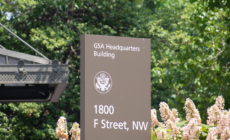-
Donald Trump Dealt Blow by Texas Judge He Appointed - 19 mins ago
-
House Votes to Curb National Injunctions, Targeting Judges Who Thwart Trump - 42 mins ago
-
Aircraft Carrier HMS Prince of Wales Heading for West Pacific - 54 mins ago
-
The Real ID Deadline Is Coming. Here’s What You Need to Know. - about 1 hour ago
-
DOGE Cuts Update Today: Over a Dozen Buildings Sold Off - about 1 hour ago
-
Lawyer Confronts ICE Agents in Video Viewed Over 16M Times: ‘Must Be a New Policy’ - 2 hours ago
-
Inside Factories in China, a Struggle to Survive Trump’s Tariffs - 2 hours ago
-
Who is Jillian Lauren? Wife of Weezer Bassist Scott Shriner Shot by Police - 3 hours ago
-
Kim Shin-jo, North Korean Commando Who Sought to Kill South Korea’s Leader, Dies - 3 hours ago
-
Peanut Recall Sparks Warning to Customers - 3 hours ago
Big Tech ‘Magnificent Seven’ Stocks Take a Hammering in Premarket
The largest tech companies in the U.S. have all seen drastic drops in premarket stock prices, as markets continue to grapple with the ramifications of President Donald Trump’s “Liberation Day” tariffs.
The “Magnificent Seven”—a group of Nasdaq companies that include household names such as Apple, Microsoft and Google—saw drops as high as 7 percent since markets closed on April 2.
Newsweek contacted the White House for comment on the tariff policy’s effects via email.
The Context
The newest wave of tariffs, which have been applied to dozens of countries worldwide, are set to have a significant effect on global supply chains. Tech companies are uniquely susceptible to changes to these chains, as they are more reliant on complex technologies, such as semiconductors, developed internationally. As a result, the U.S.’s tech industry is feeling the strain more acutely than other parts of the economy.
Which Companies Are the Magnificent Seven?
The Magnificent Seven is a group of the largest tech companies on the stock market, with a historic record of strong performances.
These companies are considered the Magnificent Seven:
- Amazon (AMZN)
- Nvidia (NVDA)
- Meta (META)
- Alphabet (GOOGL)
- Microsoft (MSFT)
- Tesla (TSLA)
- Apple (AAPL)

Getty Images
What To Know
On April 2, after the markets had closed, Trump announced a baseline 10 percent tariff on more than 180 countries, with several receiving additional reciprocal tariffs. Shortly after the announcement, which saw tariffs higher than 30 percent placed on major tech suppliers China and Taiwan, stock for all seven companies dipped drastically on the premarket.
Apple was the hardest hit, dropping by 7.45 percent. The stock, which had closed at $223.19, is now headed to be below $200 once markets open.
Elon Musk’s Tesla, which published disappointing first-quarter sales numbers on Wednesday, dropped by 4.02 percent, though it received a boost amid rumors that Musk might step down from his political positions to focus on the company.
Amazon dropped by 5.61 percent, while Alphabet, the parent company of Google, dropped by 2.59 percent.
Meta, the largest stock in the group, dropped by 3.48 percent, while Nvidia, a major chip supplier to many of the other companies in the Magnificent Seven, dropped by more than 4 percent. Nvidia relies significantly on exports from Taiwan, which received a new tariff rate of 32 percent on Wednesday.
What People Are Saying
Michael Field, an equity strategist at Morningstar, told Newsweek: “That Asian countries got hit much harder than Europe will be of no consolation to businesses.
“A 20 percent tariff on all European goods is potentially devastating for many industries, if indeed these tariffs are permanent and fixed in nature. This is unlikely, given that administration officials have intimated that negotiation will be possible. Short-term disruption is inevitable, however, given that the tariffs come into place on April 5, leaving governments no time to stop the process.
“Consumer goods, health care and industrials sectors will be among the sectors worst affected by the new measures. Worse, possibly, will be the response by the EU, and the likely counterresponse by the U.S. government, all of which will ratchet up the damage to exporting and importing businesses.”
What Happens Next
The new baseline tariff is set to go into effect on April 5, with reciprocal tariffs following on April 9. The exact nature of the market’s response to the policy may come into sharper relief when trading opens on April 3.
Source link























